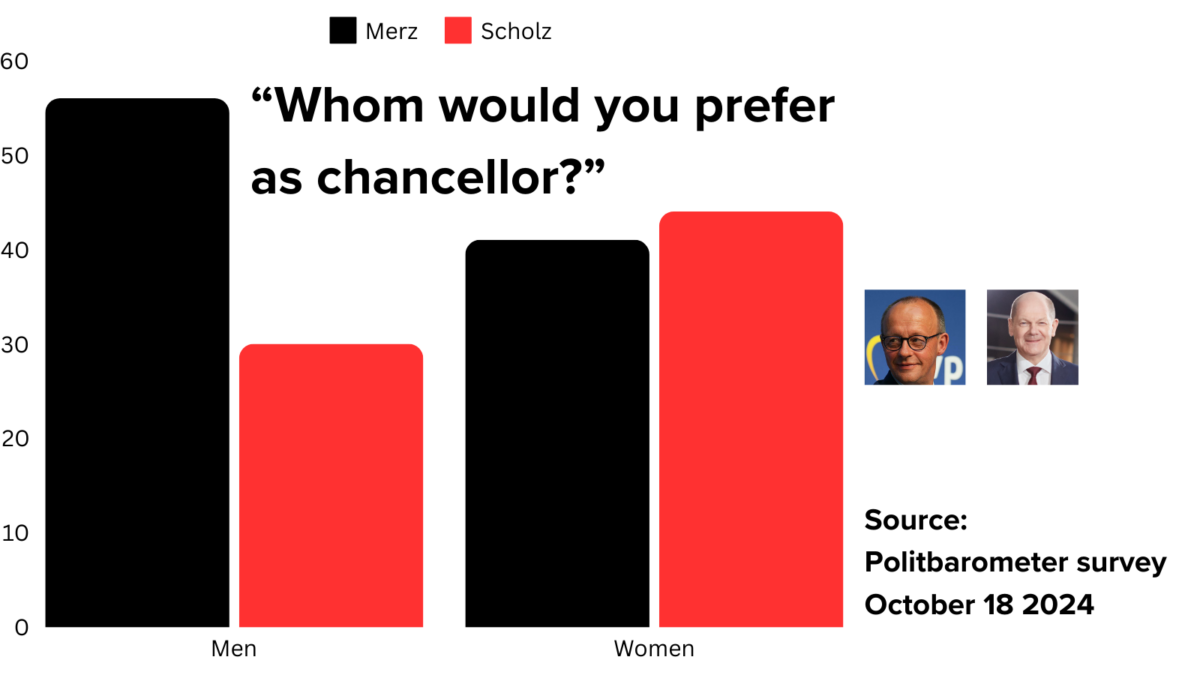While much has been said written about the gendered support for Trump versus Harris during these frantic last weeks of the campaign in the US, the latest data from Germany’s Politbarometer survey reveal a similarly intriguing pattern. The current German Chancellor, Olaf Scholz, enjoys a slight edge in favorability amongst women compared to his likely successor.
However, the real kicker is the stark gender gap in support for Friedrich Merz, the opposition leader and CDU chairman.

Amongst male voters, Merz boasts an astounding 26-point lead in favorability compared to Scholz. What is behind this dramatic disparity?
Part of it is certainly due to the “modern gender gap”. Whereas women tended to support conservative/Christian parties in the past, in many western societies this pattern has been reversed over the last three decades. Female voters now lean towards left and left-libertarian parties. Whatever their personal qualities may be, preferences for Merz vs Scholz may simply reflect preferences for the parties they lead.
But of course there is also a personal dimension to it. Scholz claims to be a feminist. For better or worse, he has led a coalition that styled itself as “progressive”, even if little of this ambition survived their first year in office.
Merz, on the other hand, had one ambition during his political life: to unseat Angela Merkel, and to roll back what ever liberal-ish nonsense she brought to the party. Under his stewardship, the CDU’s image (never exactly progressive) has become older, more male, and more conservative.
While he is just four years older than Scholz, he seems to belong to a different generation. His advisors are clearly trying to curb his instincts, but this is only possible and credible up to a point. If Jacob Rees-Mogg was the member for the 19th century, Merz is certainly the MdB for the 1990s.
Will any of this matter in eleven months’ time? I don’t know. The Politbarometer numbers reflect a double hypothetical. They are the answer to the question of how voters would choose if they could decide who becomes chancellor, and if they had to select their chancellor from these two. In reality, people vote for parties, and the Spitzenkandidaten (and the images, ideas and qualities they represent) are just one factor amongst many others. And neither Scholz (who is the incumbent and still spectacularly unpopular) nor Merz (who, as the leader of the strongest and only plausible opposition party, is still not very popular) is what anyone could call a strong candidate.
Moreover, right now, immigration and the economy seem to crowd everything else out in the public discourse. Any and all progressive-smelling issues have been pushed to the furthest back burner. And still: a candidate that is so obviously polarising, a man who manages to be less popular than Olaf Scholz with slightly more than half of the electorate, must surely be a liability for the Christian Democrats.
Discover more from kai arzheimer
Subscribe to get the latest posts sent to your email.


